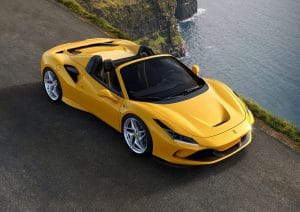Ferrari officials offered an optimistic look ahead despite a difficult second quarter when its net income fell 95% and deliveries fell by nearly half.
The Italian sports car maker said that despite the tough quarter, induced by the global COVID-19 pandemic, the company expects an improved third quarter as the company’s order book saw a double-digit increase compared with year-ago results.
“Demands remains vibrant and our order book is up significantly,” Chief Executive Louis Camilleri told analysts, according to Reuters.
(Ferrari pushes back arrival of full-electric vehicle until 2025.)
Like most automakers around the world, the company was forced to shut down its operations for a few months, which led to a 60% drop in adjusted EBITDA to 124 million euros, or $145 million. This was in line with analyst expectations of 120 million euros, according to Reuters.
The company’s income drop came on declining revenues, which were 571 million euros, or $671.2 million, for the quarter. For the first six months, the company reported net profit of 175 million euros, or $205.7 million, a decline of 52%. However, its adjusted EBITDA was a bit better, at 441 million euros, $518.4 million, a drop of 29% on revenue of 1.5 billion euros ($1.76 billion).
During the second quarter, Ferrari shipped 1,389 units, which was down 1,282 units or 48% versus prior year. Sales of 8-cylinder models were down 49.4% while the 12-cylinder vehicles decreased 42.9%. The first few deliveries of the F8 Spider and the 812 GTS commenced in the quarter, while the 488 Pista family approaches the end of its lifecycle.
(Ferrari unveils newest supercar: The Roma.)
The company laid out some of its plans and expectations for the rest of the year, including that it believes it can tweak its production schedule “resulting in a recovery of some 500 cars partially offsetting the loss of approximately 2,000 units incurred during the plant shutdown.”
There will be delays in the full production ramp up of the SF90 Stradale, implying a softer mix for the brand. The company also reconfirmed its capital expenditures for 2020 should come in at approximately 750 million euros.
The company also revised its guidance for the year, offering a narrower range of what to expect. The company now expects full-year adjusted EBITDA of between 1.075 billion–1.125 billion euros, versus the guidance provided in May for adjusted EBITDA of between 1.05 billion and 1.2 billion.
(Ferrari plugs in, charges out with its first-ever plug-in, the SF90 Stradale.)
Ferrari is also pushing ahead with its strategy of new model roll-out to support growth and profitability, confirming that two new supercars would be unveiled by the end of this year, Camilleri noting that next year the brand will have “some exciting models that will be presented.”



